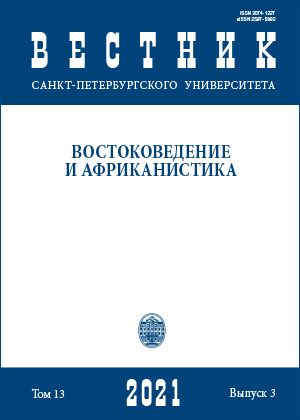The Cultural Spirit of the “May Fourth Movement” and Lu Xun’s Ambivalent Thinking
DOI:
https://doi.org/10.21638/spbu13.2021.305Abstract
The “May Fourth Movement” is undoubtedly a turning point in the history of modern Chinese society and culture. It must be acknowledged that the direction of development of Chinese culture was largely influenced by famous Chinese writer, educator and revolutionary Lu Xun (1881–1936). The structure of Lu Xun’s ideas and the influence of Lu Xun’s ideas today have shaped the ever-living “Lu Xun’s culture”. The main essence of Lu Xun’s culture is embodied in many important judgments regarding the development of the nation, society and culture. These judgments are aimed not only at the past, but also at the future and the present. Many of his thoughts were a century ahead their time. Speaking about Lu Xun’s anti-traditionalist approach to the development of new culture, one cannot ignore the rationalistic cultural spirit of the enlightenment ideology behind it. Lu Xun’s pessimism at the beginning of the “May Fourth Movement” and the subsequent bitterness can serve as a key to understanding the cultural spirit of the “May Fourth Movement” and its logical connection with Lu Xun’s culture. Analyzing Lu Xun’s criticism of China’s unrealized democracy and his skepticism about the new culture, one can see that Lu Xun’s inner mood is shrouded in a shadow of disappointment. Moreover, until the end of his days, he was accompanied by pain caused by too sober and deep perception of life. In addition, the reason for Lu Xun’s distrust is that too often, due to his decency and simplicity, he was deceived. We believe that the spiritual world of Lu Xun has always been characterized by the presence of two levels: Lu Xun is open, throwing loud calls, and Lu Xin is hidden, suffering and lonely. At the same time, his inherent sharpness stems from a deep understanding of the situation, and his bitterness comes from a firm will and an uncompromising attitude to his views. The reason for such bitterness is due to the strength and immensity of the objects of his resistance. Lu Xun’s views have enriched the thinking of China and all mankind.
Keywords:
“May Fourth Movement”, Lu Xun, China, anti-traditional orientation, rationalistic spirit
Downloads
References
Downloads
Published
How to Cite
Issue
Section
License
Articles of "Vestnik of Saint Petersburg University. Asian and African Studies" are open access distributed under the terms of the License Agreement with Saint Petersburg State University, which permits to the authors unrestricted distribution and self-archiving free of charge.





